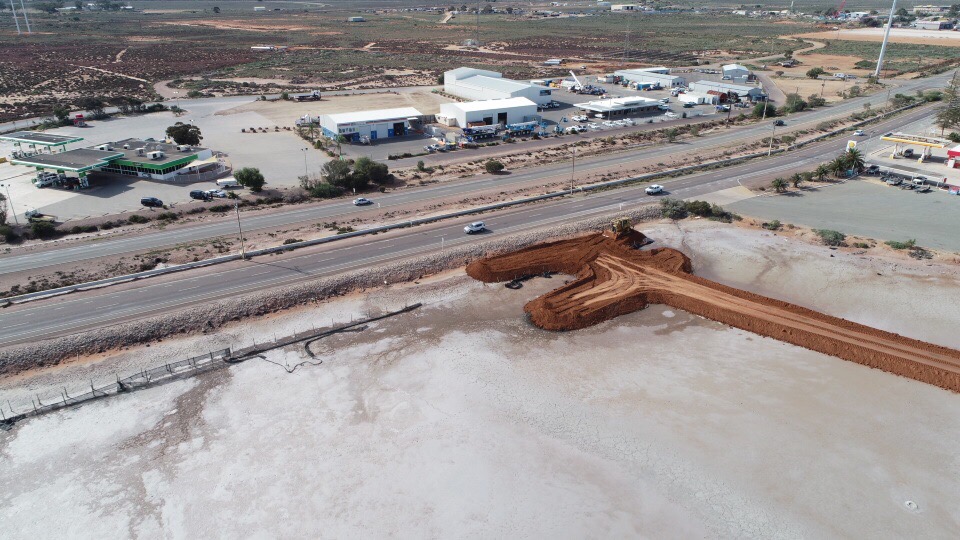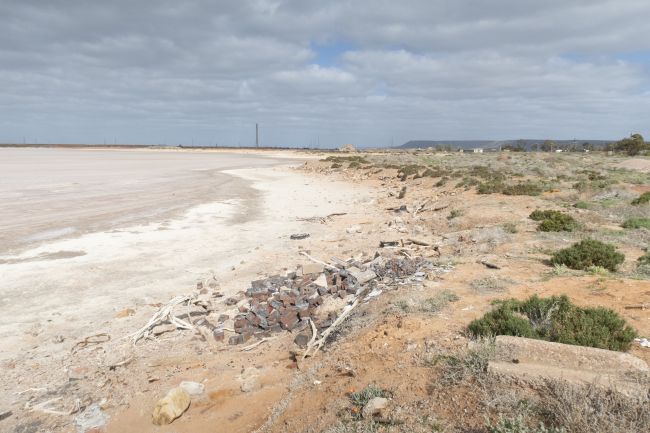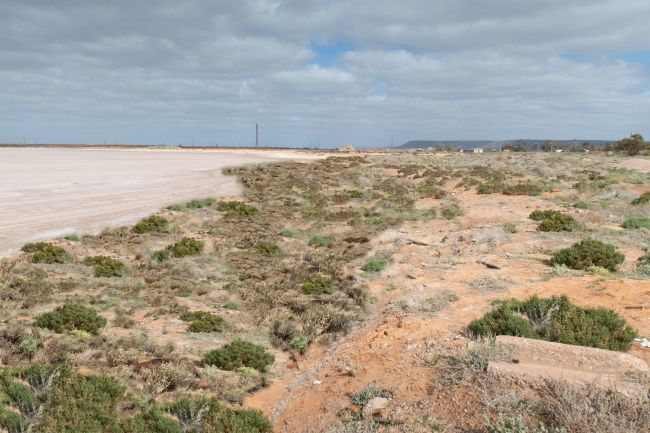Bird Lake Project
Update March 2021 - Plants starting to grow!
In September last year (2020), soil spread around the perimeter of Bird Lake was seeded with species of low-growing local native plants that are tolerant of the lake’s highly saline and arid conditions. It was not able to predict how long the seeds would take to germinate, yet excitingly plants are already starting to emerge and grow.
In December last year, plant growth was measured at five locations around the lake. An average of 2.5 plants were found to be growing per m2 with up to 28 plants per m2 in some locations. The locations on the northern and western sides of the lake have had the most plants emerge. Across all locations, saltbush plants (eg. Atriplex and Maireana sp) have had the largest numbers of plants germinating.
The good growth is believed to have been encouraged by the fairly good condition of the soil crust and above average rainfall received between August and December last year. November was the exception with below average rainfall. At that time it was decided to apply a dust suppressant to the soil because the long-range weather was not looking favourable with hot, dry and windy conditions expected over summer.
Growth is still patchy in some places, particularly where there is more foot traffic (e.g. near the toilet block). The continued germination and growth at the site will be dependent on rainfall and preventing damage to the soil crust or plants by people, cars and motor bikes.
Update September 2020 – On-ground works completed
On-ground works for the Bird Lake Project were completed in mid-September 2020. Soil has been transported and spread around the perimeter of the lake and seeded with species of low-growing local native plants that are tolerant of the lake’s highly saline and arid conditions.
The timing of when the seeds at Bird Lake germinate and start to grow will depend on rain. There may or may not be growth before summer 2020/21 and some plants may start growing and die if it is very hot/too dry. However, experience from similar projects in the area shows that eventually plant cover will establish and increase.
It has been decided not to apply dust suppressants at this time as the suppressants may limit the germination and growth of the native plant seeds. Ultimately, it will be plant growth and cover that will limit the spread of dust from the area and as such the seeds need to be given the best chance to germinate and grow. The project will monitor the site and if dust becomes a major problem, a dust suppressant will be applied.
The Project Team would also like to thank the Bird Lake Community Reference Group for their participation.
For more information about the works, anticipated plant growth and dust management, please read the latest newsletter.

Update - June 2020
Contractors have started to excavate soil from the Cu River Port Australia site and move it to the perimeter of Bird Lake.
The $3.2 million project will transport soil and plant native vegetation in a bid to stop the stench and improve the amenity of the area, it will also be part of Councils revitalisation plan for the town.
It is expected the project will take approximately a further 4 months to complete.
Update – April 2020
Project on-ground works will begin in the week commencing 4 May 2020.
Last year Cu River Mining Australia purchased the adjacent former power station site from which soil needs to be excavated for the project.
We are happy to announce that an agreement has been finalised with Cu-River Port Australia Pty Ltd. for our contractor to establish machinery and start to excavate soil from the Cu River Port Australia site and move it to the perimeter of Bird Lake.
The timing of the commencement of site works will give the seeds of native plants the best chance to germinate and grow after the passing of the hot, dry and windy time of year.

Bird Lake in Port Augusta is being rehabilitated with local native plants in selected areas to reduce the potential for odour issues and improve the area.
The project is being delivered by the Port Augusta Council with the cooperation of land owners and funding support from the South Australian Government.
Why does Bird Lake smell?
Bird Lake is a part of the Augusta Lakes salt-lake system. In its natural state the lake is not full of water and historically foul odours and biting insects were a problem from time to time.
The odour coming from Bird Lake is mainly caused by decaying mats of algae around the lake edge. The algae grew while the lake was kept full from water that overflowed from an Ash Disposal Area when the Northern Power Station was in operation. When the Power Station closed and the lake dried out, the algal mats were exposed and started to decay. How strong the odour is, is dependent on the wetting and drying of the algal mats.

How is it being rehabilitated?
Bird Lake is being rehabilitated by covering areas of decaying algal mat around the fringes of the lake with soil and seeding this soil with low growing local native plants that are tolerant of the highly saline and arid conditions. “Capping” the algal mats this way will reduce the potential for odour from the lake. Rubbish scattered around the lake and the old cloth screens adjacent the highway will also either be removed or buried under the capping soil.
The works will take place from March to July 2019 following community, landholder and stakeholder engagement. Follow up seeding may be undertaken in Spring 2019 or Autumn 2020 if appropriate.
Want to in touch or get involved?
To receive updates about the project’s progress or to register your interest to be a part of the project’s community reference group, please send your contact details or call the project at the contact details below. The community reference group will participate through either email updates and or meetings as a way of providing ongoing community input into the project.







